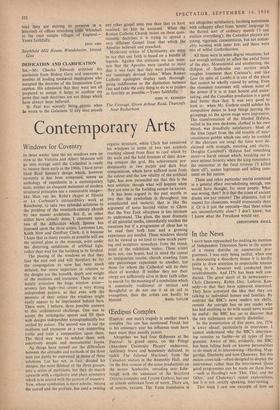CEechpus Complex
CEDIPUS: one man's tragedy is another man's complex No one has mentioned Freud, but in his centenary year his influence must have been more than usually potent.
Altogether we had four CEdipuses at the Festival : in grand opera, on the Fringe (Aberdeen University Players' endeavour, recklessly brave and hopelessly defeated, to tackle The Infernal Machine); from the Canadian visitors in the Assembly Hall; and (in the film version of the same production) on the screen Sophocles. intruding into Edin- burgh with the assistance of the Stratford Ontario company and Tyrone Guthrie, has met an almost unbroken front of scorn. There are, of course, excuses. The Yeats translation is
not altogether satisfactory, lurching sometimes with unhappy effect from 'poetic' language to the flattest sort of ordinary speech ('I can explain everything'); the Canadian players are young, vigorous, conscientious, but not notice- ably burning with inner fire; and there were bits of wilful Guthrification.
All these were in some degree vexatious; but not enough seriously to affect the awful force of the play. Monumental and unrelenting, the (Edipus of Sophocles can survive much rougher treatment than Cocteau's; and like Lear (in spite of Lamb) it is one of the plays that cannot be wholly ruined by acting. Even the clumsiest treatment will release some of the power if it is at least honest and pains- taking; and the Canadian production is a good deal better than that. It was very good to look at: when Mr. Guthrie could subdue his compulsive desire to keep things moving the groupings on the apron stage were impressive. The transformation of the blinded CEdipus, veiled in his own darkness, clothed in his own blood, was dreadfully satisfactory. Most of the time (apart from the old trouble of near- unanimous gabble which can only be avoided if the choruses are sung) the lines were de- claimed with strength, meaning and clarity. Douglas Campbell's CEdipus had something more—a harsh unease which, breaking out in pure animal ferocity when the king remembers the encounter at the fatal trivium ('I killed them all'), makes legitimate and telling com- ment on his nature.
These and other particular merits combined in a general effect overwhelming enough, one would have thought, for most people. What was wrong, then? Is it that the crises of ancient drama are too remote? The objectors, full of respect for classicism, would strenuously deny it. Or is it just the opposite—that these crises are uncomfortably close? I don't know; but I know what the Freudians would say.
CHRISTOPHER SMALL


































 Previous page
Previous page